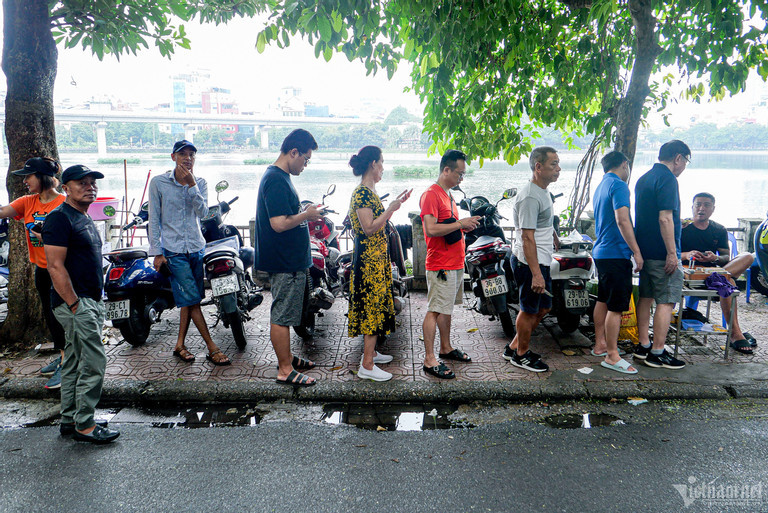
While some people said that it was a waste of time and they would not wait a long time to buy their favorite food, others said the culture of queuing should be respected.
Queuing can be seen in many developed countries. Many restaurants and street shops have become well known to diners thanks to images of people queuing.
In fact, long queues at eateries are familiar to Vietnamese. But the behavior of queuing for food has been criticized as new dishes and drinks have been introduced recently, attracting large sales.
As many people like these new dishes and drinks, eateries have become overloaded. Because the number of seats is limited, they have to wait up to several hours to be served.
The images of people queuing and hustling at eateries to order coffee with salt, hand-pounded lemon tea, cheese coin cake, and custard cake have been posted online by young people, especially food vloggers.
Pham Hong Long, Dean of Tourism Studies under the Hanoi University of Social Sciences and Humanities, said that queuing to enjoy traditional dishes, such as pho, vermicelli and bread, is the habit of many people, mostly middle-aged and elderly people at longstanding, popular places.
But behavior of many young people queuing to taste new drinks and dishes, such as coffee with salt and hand-pounded lemon tea, is seen as a "hobby to satisfy the curiosity of youth".
Long said that queuing to enjoy delicacies should not be criticized and it is not a disgrace to line up as some people think. Diners who queue do not think they are wasting money, because they have planned ahead and they can wait and kill time by talking with others or using their smart devices.
“They are willing to queue to receive high-quality services and food, and they don’t feel uncomfortable about this,” he explained.
Long, who has visited many countries, said he sometimes had to line up and wait one or two hours to be served ramen and udon noodles at restaurants in Japan.
Tran Thanh Nam, vice rector of the Hanoi University of Education, a member school of Hanoi National University, said people today do not eat and drink just to be full but also for a cultural experience.
“I know many eateries that have existed for a long time. They are not spacious or well decorated, but they still can attract diners because they provide high-quality products and they bear local cultural characteristics. In other words, the eateries have sustainable values,” Nam said.
“Diners come to the eateries to enjoy the dishes and experience cultural values. They don’t care about having to queue to get food. In this case, the behavior of lining up not only targets material value, but spiritual value as well,” he said.
But Nam differentiated the queueing behavior of elderly people and young people.
He said youth do this just to "follow the crowd" and to become "trendy". They line up not because they want high-quality drinks, but because they want to become the first clients experiencing the drinks and leading the trends.
“For these clients, eating and drinking are not their major purposes. They just go to post pictures on their Facebook pages. They just run after trends, not taste food for its high quality,” Nam said.
However, Le Anh Tu from Van Lang University said he liked the culture of lining up instead of jostling, describing it as "civilized behavior".
Linh Trang